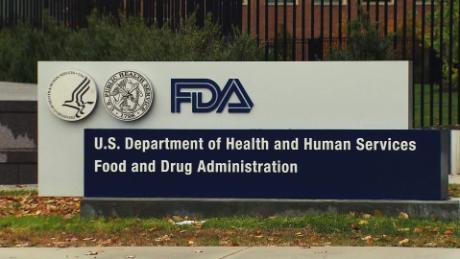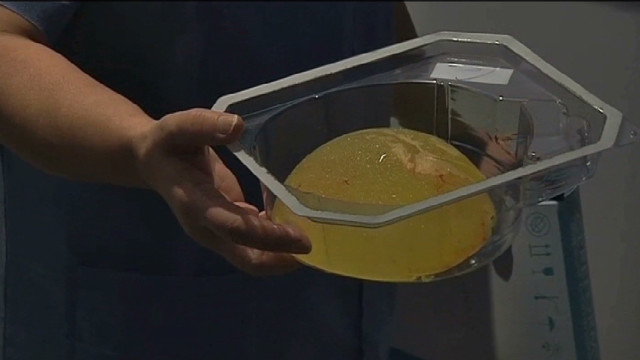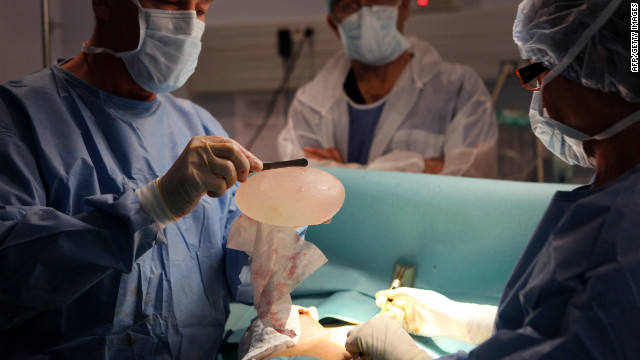(CNN)Many women have breast implants with no serious complications, but there have been cases where women suffer pain and fatigue, among other health problems.
Now, the US Food and Drug Administration is holding a meeting to take a closer look at such cases and put breast implant safety under a microscope. The meeting involves hearing from from patients, physicians and industry representatives.
The FDA Medical Devices Advisory Committee's General and Plastic Surgery Devices Panel convenes Monday and Tuesday to discuss and make recommendations relating to the risks and benefits of breast implants.
The meeting, which is open to the public, comes just days after the FDA issued warning letters to two breast implant manufacturers for failing to comply with the agency's requirements to conduct long-term studies assessing the safety and risks of their silicone gel-filled implants.
The committee plans to discuss reports of breast implants being linked to a rare cancer called anaplastic large cell lymphoma; the use of registries for maintaining breast implant surveillance; and best practices for informed consent discussions between patients and clinicians, among other topics.
"We've also heard from patients who are concerned that their implants may be connected to other health conditions that could be associated with their immune system's response to these devices, resulting in symptoms like chronic fatigue, cognitive issues and muscle pain," FDA commissioner Dr. Scott Gottlieb and Dr. Jeff Shuren, director of the Center for Devices and Radiological Health, said in a FDA statement earlier this month.
"While the FDA doesn't have definitive evidence suggesting breast implants are associated with these conditions, we're looking to gain a fuller understanding of this issue to communicate risk, minimize harm and help in the treatment of affected patients. This topic will be discussed at our upcoming two-day public meeting," the statement said.
Many plastic surgeons in the meeting reported patient satisfaction with breast implants, but agreed that patients should have all up-to-date information in order to make a choice when considering breast implants.
Jamee Cook, among several patients in attendance at the meeting on Monday, said that women are not being provided the full scope of risks that may come with breast implants -- and more awareness is warranted, she argued in the meeting. For instance, she said that some breast implant patients are unaware of the need for follow-up MRIs to monitor implants for rupture, along with the costs of that care.
Cook, a Dallas-based patient advocate and founder of the Breast Implant Victim Advocacy group, detailed in the meeting how her health declined after getting breast implants for cosmetic reasons. She developed fatigue, migraines and swollen lymph nodes, among other symptoms, she said.
The mother of three boys also mentioned in the meeting that she had her children after her breast implant procedure. She said that she often fears that her breast implant-related illness may have played a role in some health issues that her first two sons developed.
Another patient in the meeting called for a black box warning on breast implants. Also called a boxed warning, it appears on a prescription drug's label to call attention to serious or life-threatening risks, according to the FDA. The patient also called for mandatory testing for health risks associated with breast implants, including breast implant-associated anaplastic large cell lymphoma.
Several patients at the meeting asked for implants with textured surfaces -- a type that has been linked to more cases of illness than smooth-surfaced implants -- to be taken off the market. Last year, the biopharmaceutical company Allergan withdrew textured breast implants in European markets following a compulsory recall.
Along with agency officials and patients, the meeting will involve input from some experts, including representatives from the American Society of Plastic Surgeons.
The ASPS worked closely with the FDA in creating a registry to track cases of lymphoma-linked breast implants in 2012, and then last year to create an overall National Breast Implant Registry, said Dr. Alan Matarasso, president of the ASPS, which represents about 93% of all board-certified plastic surgeons in the United States and thousands worldwide.
"We are in regular communication with the FDA to share data and insights about patient safety," Matarasso said, ahead of the FDA meeting.
"Breast implants are among the most studied medical devices in the world, and they will continue to be so," he said. "Hundreds of thousands of patients each year in the US opt for breast implants and report no adverse effects. When a possible association with a rare disease is reported, we follow the science to provide detailed, accurate information to improve patient safety."
There are two types of breast implants approved for sale in the United States. They both have a silicone outer shell, but one is saline-filled and the other is silicone gel-filled. They can vary in size and shape, and are typically implanted to either increase breast size or to rebuild breast tissue, such as after a mastectomy or other damage to the breast.
The ASPS released new data earlier this month that revealed 313,735 breast augmentation procedures were performed in 2018, which was a 4% jump from the 300,378 procedures conducted in 2017.
Breast augmentation was the most popular cosmetic surgical procedure performed in 2018, according to the ASPS statistics.
While most breast implant patients are happy with the procedure, as many as 20% of women who receive implants for augmentation have to have their implants removed within eight to 10 years, relating to complications, according to the FDA.
"Breast implants are not meant to be lifetime devices, they have a lifespan and that might range from seven to 10-plus years, based on the implant and patient," said Dr. Tommaso Addona, a plastic surgeon and president of the Long Island Plastic Surgical Group in New York, who is not involved in the FDA meeting.
Get CNN Health's weekly newsletter
Sign up here to get The Results Are In with Dr. Sanjay Gupta every Tuesday from the CNN Health team.
The benefits and risks of breast implants, which will be discussed in the meeting, remain important and sit at the forefront of plastic and reconstructive surgery, Addona said, adding that he often discusses benefits and risks with his own patients.
"We do discuss complications. Those range from scarring around the implant, sometimes soreness and discomfort from the implant ... to in the last seven years, probably a bit more, we've become more acutely aware of a specific type of lymphoma that is associated with breast implants," he said. "What the general public should appreciate is, as doctors and clinicians, we always want what's best and safest for our patients. We're constantly not only educating ourselves but educating our patients."








